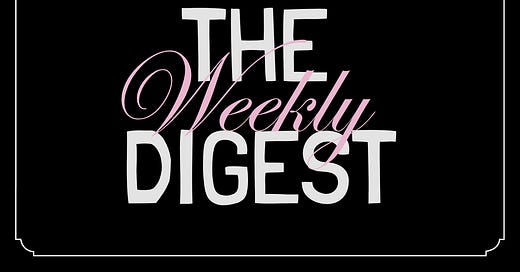Welcome to the Weekly Digest, a bite-sized breakdown of everything that shaped consumer culture over the past seven days. From viral product launches to shifting shopping habits, we’re diving into the trends, controversies, and conversations that defined the week.
Let’s Digest!
1. Sew Long, Joann! Crafting Giant Closes Its Doors for Good"
In a previous Weekly Digest, we discussed Barnes and Noble’s comeback, opening almost 60 new stores admits a culture of declining brick and mortar. Unfortunately, JoAnns is opening a different chapter, Chapter 11 Bankruptcy to be exact. The fabric retailer is closing all 800 locations mainly due to inventory issues and lackluster consumer demands.
Are we getting to a point in conscious consumerism that promotes in person shopping as a means to keep stores open and people employed ?
Is community beginning to out way convenience?
Are Protective Styles Even Protective?
A recent Consumer Report suggests that beauty might not just be pain—but a matter of life and death. Carcinogens were found in all ten of the most popular braiding hair brands tested. As someone who wore braids religiously—and as a Black person whose entire family wears braids—this is beyond concerning.
Box braids typically last 4–6 weeks, and for many, they’re not just an occasional style but a year-round go-to. This means that some of us could be living with carcinogens not only on our heads but also washing over us in the shower and resting on our pillows—without even knowing it.
This isn't the first time concerns about Kanekalon hair have surfaced. There have been murmurs and anecdotal stories—folks sharing experiences of itchy scalps, dermatitis, and allergic reactions. But for the most part, these concerns have felt more like whispers than warnings. And let’s be honest: for many of us, the hesitation around braids has been more about preserving our edges than protecting our health.
But with findings like these, that mindset might change—and fast. The report revealed that three of the products tested contained benzene, a known carcinogen linked to acute myeloid leukemia. Two products had an animal carcinogen, and all ten contained methylene chloride, a probable carcinogen. As Rogers points out, “It is strictly regulated and discouraged to use in laboratories because of its potential to cause cancer.”
It’s a lot to take in. For a community where braids are not just a style but a cultural staple, these revelations are a reminder that we deserve not only beautiful hair but safe hair, too.
Let’s close this with an optimistic note - there are a few brands that offer healthy alternatives.
Political Bullys?
This week, Volodymyr Zelensky visited the Oval Office for what turned out to be a new kind of political spectacle—one part Joe Rogan, one part Fresh and Fit, with a dash of Baddies: Oval Office. It was less of a conversation and more of a confrontation, filled with bullying, finger-pointing, and enough yelling to make you question the heirloom of decency in American democracy.
At the center of the chaos was J.D. Vance, who seemed more interested in instigating than engaging. The whole scene felt like a reality show reunion special, where diplomacy took a backseat to drama, and civil discourse was nowhere to be found.
The Economic Blackout
The first two months of the year have been nothing short of challenging. Diversity, Equity, and Inclusion programs have been shut down nationwide, thousands of federal employees laid off, and the once rose-tinted glasses of democracy now seem clouded with red. On February 28th, a nationwide economic blackout was called, with social media posts spreading the word like wildfire.
Collective action has become almost synonymous with “voting with your dollar.” It’s a form of political engagement that takes place on the financial playground—a way to change the things we cannot accept when traditional political avenues fall short. As democracy leans further into business and technocracy, it’s clear that for many citizens, the strongest message they can send is through their wallets.
Consumer habits have become a powerful tool, with the knowledge that where we shop is an extension of what we believe. Conscious consumers wield their dollars as votes, choosing for or against the practices of major corporations like Amazon, Walmart, Target, and beyond.
It all brings me back to something my mom always told me: “Go where you are celebrated, not tolerated.” Now, it feels like that advice applies not just to people and places but to the businesses we support, too.
Keep reading with a 7-day free trial
Subscribe to Consumer Digest to keep reading this post and get 7 days of free access to the full post archives.




